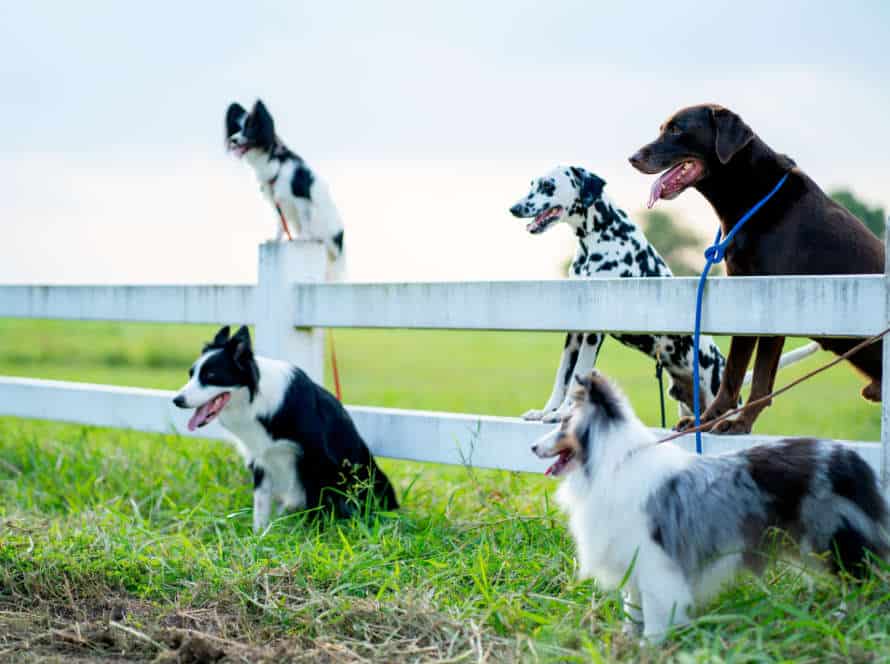Breed Stereotypes Debunked: Can Any Dog Be Trained?
Yes, any pup can be trained – no matter the breed! Even if some breeds are more likely to have certain behaviors, any dog can learn basic commands – or even more advanced skills – with the right training, time, and patience. Techniques used should fit a dog’s personality, energy level, and motivations.
It’s key to remember that breed stereotypes don’t always reflect reality. A dog’s behavior is impacted by genetics, training, socializing, and past experiences. Get to know your pup’s personality and behaviors. Then, seek help from a professional to make a plan that works for your pup.
Pro tip: Obedience train early – as soon as you get a new pup – to set good habits and avoid behavior problems down the line.
All Breeds Can Be Trained
Many people wrongly think that some breeds of dogs cannot be trained. This, however, is not true! All breeds of dog have the potential to learn with the right trainer. How can any breed of dog be trained? Let’s take a look!
The Myth of Untrainable Breeds
The idea that certain dog breeds are untrainable is a myth. All breeds of dogs can be taught with patience, consistency, and positive reinforcement. Stereotypes about breeds are not based on science or facts, but on generalisations and misunderstandings.
Though breeds have their own characteristics and personalities, training and socialisation can help them form good behaviours and reactions. For instance, Pitbulls, Rottweilers and German Shepherds are often thought to be aggressive and hard to train. But, with proper training, these breeds can become loyal, obedient and well-mannered pets.
To summarise, any dog can be trained, regardless of breed or temperament. By understanding and disproving breed stereotypes, we can create a better world for dogs and their owners.
The Reality of Breed Differences in Ability to Learn
All dogs have the ability to learn and can be trained! Even though breeds may display certain characteristics, all dogs are unique. Recent studies have shown there is no strong evidence that some breeds are easier or harder to train than others.
It’s important to approach dog training with a positive attitude, patience and consistency, regardless of breed. Personalising your training to fit your dog’s needs and personality can also help with obedience and behaviour training.
The Importance of Individual Dog Temperament and Learning Style
Dog temperaments and learning styles are a big part of how they respond to training. It’s wrong to think only certain breeds can be trained. Any dog can be trained, with the right methods.
Dogs with different temperaments and learning styles need different approaches. A high energy, prey-driven dog may need more physical exercise and positive reinforcement. Dogs with fear or anxiety may need more patience and gentleness.
It’s important to understand your dog’s temperament and learning style. Then, find the best way to train them. With the right approach, patience, and practice, any dog can be taught to be a great companion.
Pro Tip: Be patient and consistent with your pup. Don’t use physical punishment or negative reinforcement. They can hurt your dog. Rather, use rewards-based training to reward good behavior.
Effective Training Techniques for Any Breed
No matter the size, color, or breed characteristics, all breeds of dogs can be taught to obey commands. It may take more time for some breeds to learn, but with patience, any pup can be trained. Below are the top training methods for any kind of dog:
Positive Reinforcement Training
Positive reinforcement training is a great way to train any pup! It helps break the stereotype that some breeds are untrainable.
How does it work? You reward your dog for good behaviour instead of punishing them for bad actions. This could be with treats, praises, or toys. The goal is to make the pup link good behaviour with positive outcomes, so they will repeat that behaviour in the future.
It works for any breed, even those considered “untrainable”. Pit bulls and chihuahuas have been trained successfully using positive reinforcement!
By using this method, you can create a happier relationship with your dog and help them become a well-behaved and obedient friend.
Clicker Training
Clicker training is a great way to teach any pup! You use a clicker device that makes a sound when pressed. This sound marks the behavior you want, then you reward with a treat.
Contrary to popular belief, there’s no such thing as an untrainable dog. Positive reinforcement techniques, like clicker training, can work wonders.
To get the most out of this training method, keep sessions short and sweet. Use high-value treats and be consistent.
Pro tip: Start with easy behaviors. As your pup masters each one, increase the difficulty level.
Consistency and Patience
Consistency and patience are the main ingredients for successful dog training, regardless of breed. Whether a Chihuahua or a Great Dane, consistent commands and positive reinforcement will lead to good results.
For training any pup:
- Set up a consistent routine. Include the time, place, and length of each session.
- Be clear with commands. Repetition is key.
- Reinforce good behavior with treats, compliments, or playthings.
- Don’t believe breed myths – all dogs can be trained with the correct approach and sufficient time.
Pro tip: Make the training experience positive for both pet and owner. Keep it fun and captivating and show patience as they learn and develop!
Overcoming Breed Stereotypes for Better Training
Debate rages on about some breeds being harder to train due to their reputation. Some believe that certain breeds are trickier to train and do have particular features that make them harder to work with. However, with the right training skills and loads of patience, any breed can be taught and have an incredible bond with their owner. Let us explore how to vanquish breed stereotypes when it comes to training dogs.
Understanding Breed-Specific Behaviors and Needs
Training your dog effectively? It’s essential to understand breed-specific behaviors and needs. All dogs have individual personalities, but certain behaviors are ingrained. For example, herding dogs have a strong instinct to chase and herd. They need daily exercise and training to channel that energy. Hunting dogs have a natural desire to track and retrieve. They benefit from scent-based training and outdoor time.
Tailor your training approach. Understand your dog’s breed-specific needs and behaviors. Overcome stereotypes. Build a strong, loving relationship with your furry friend.
Tailoring Training to Individual Dog’s Breed and Temperament
Tailoring training to a pup’s breed and temperament is key for successful dog instruction. Banishing breed stereotypes and uncovering deceptions about particular breeds is critical for comprehending how to train any hound.
Every breed of dog has its one-of-a-kind facets, such as energy level, temperament, and teachability. Comprehending these qualities is important for knowing how to train your pup well.
Some breeds are labeled as hard to train, like Pit bulls or Rottweilers. In any case, with the correct training procedure, any breed can be trained just as well as any other.
For training any pup effectively, it’s important to tailor the training to the individual dog’s needs. Focus on positive reinforcement and consistency. With patience, commitment, and comprehension, you can train any breed of dog to be an obedient companion.
Pro tip: Socialization is also essential in training any breed of dog. This helps your pup become familiar with a variety of circumstances.
Combatting Negative Stereotypes Through Training Success Stories
Negative dog breed stereotypes can be a barrier to training success. But these can be conquered with success stories to debunk the myths. Even if certain breeds have traits, it doesn’t mean they can’t be trained well.
Here are some training success stories to counter breed stereotypes:
- Pit Bull Terriers: Though they have a rep for aggression, many Pit Bulls have done great in obedience and agility contests. This shows that with the right training, they can be good-natured and obedient pets.
- German Shepherds: Usually thought of as too aggressive, German Shepherds can be wonderful family pets when trained properly. They are really clever and eager to please, making them open to positive reinforcement training techniques.
- Chihuahuas: Small size but big attitude – Chihuahuas can be loyal and well-behaved with consistent training and socialization.
It’s important to remember that all dogs, whatever breed, need proper training and socialization to be balanced pets. Adopting a positive training approach and looking at each dog as an individual can help break breed stereotypes and create a successful training process.
Frequently Asked Questions
1. Are certain dog breeds inherently aggressive?
No, there is no evidence to suggest that any breed is inherently aggressive. Aggression in dogs is usually the result of individual factors such as early experience, socialization, training, and individual temperament.
2. Can all dog breeds be trained to be well-behaved?
Yes, all dog breeds can be trained to be well-behaved with proper training, socialization and patience. Some breeds may require more time and patience than others, but any dog can learn to obey commands for basic obedience training.
3. Are certain dog breeds better for certain activities?
Yes, different breeds were originally developed for different tasks and some dogs may be naturally more suited for certain activities than others. For example, a herding breed like a border collie may be better for agility training while a retriever breed like a Labrador may be better for hunting or retrieving.
4. Are breed-specific laws effective?
No, breed-specific laws are not effective in reducing dog attacks. This is because breed is not a reliable predictor of a dog’s behavior. Most dog attacks are the result of irresponsible ownership and lack of proper socialization and training.
5. Are mixed breeds more trainable than purebreds?
No, both mixed breeds and purebred dogs can be equally trainable. It is important to focus on individual temperament, not just breed, when it comes to training any dog.
6. Can small dogs be trained as well as large dogs?
Yes, small dogs can be trained just like large dogs. The training process will be the same for any size dog, but the method used may differ slightly depending on the breed’s size and individual temperament.







